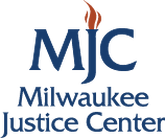About the Milwaukee Justice Center
Mission and Vision
|
Mission Statement
Through the commitment of our founding partners, the Milwaukee Justice Center is dedicated to providing free civil legal aid at the Milwaukee County Courthouse and in the community via the Mobile Legal Clinic. We endeavor to bridge the justice gap by connecting low-income self-represented people with compassionate and knowledgeable volunteers who champion equitable access to justice. Vision Statement In envisioning a world where everyone, regardless of socio-economic standing, enjoys equal access to court and legal processes, the Milwaukee Justice Center strives to be a beacon of hope, fostering a society where civil legal aid is not a privilege but a right, ensuring universal access to justice for all. |
Our History
The Milwaukee Justice Center (MJC) is a collaborative project between the Milwaukee Bar Association, Milwaukee County, and Marquette University Law School. The underlying philosophy of the project is that self-represented litigants have a fundamental right to access the justice system even if they cannot afford an attorney or do not qualify for legal aid. Generally, self-represented litigants who earn more than 200 percent of the federal poverty guidelines do not qualify for free legal services.
This means, in 2023, a single person earning more than $29,160 or a family of four earning more than $60,000 annually is considered ineligible for most free legal assistance. These families struggle to pay for basic necessities; rent, groceries and utilities. Thus, when faced with civil legal issues, many have no choice but to access the courts alone. As such, the MJC strives to address the substantive and procedural barriers facing self-represented litigants so that they can better navigate the legal system.
This means, in 2023, a single person earning more than $29,160 or a family of four earning more than $60,000 annually is considered ineligible for most free legal assistance. These families struggle to pay for basic necessities; rent, groceries and utilities. Thus, when faced with civil legal issues, many have no choice but to access the courts alone. As such, the MJC strives to address the substantive and procedural barriers facing self-represented litigants so that they can better navigate the legal system.

